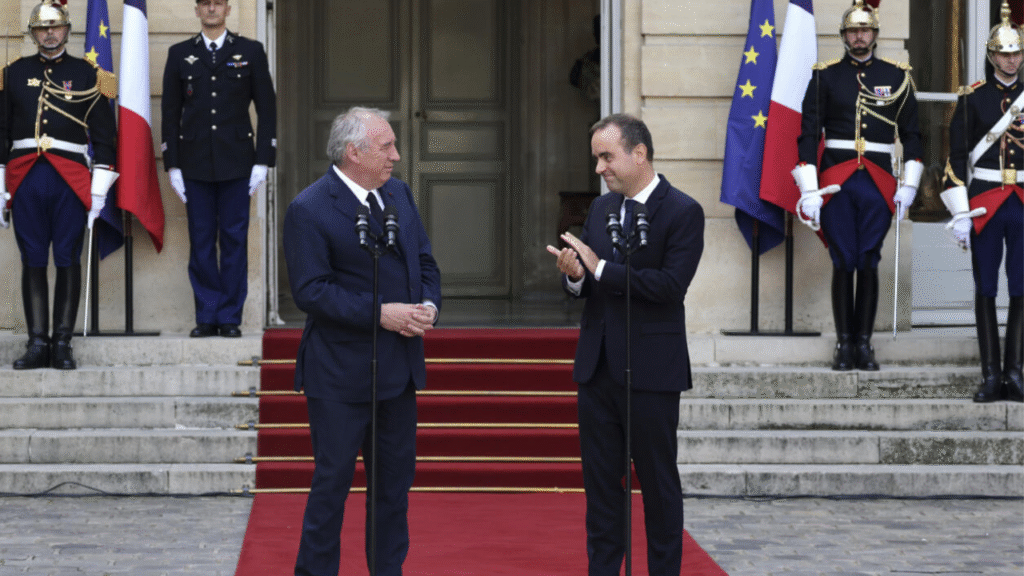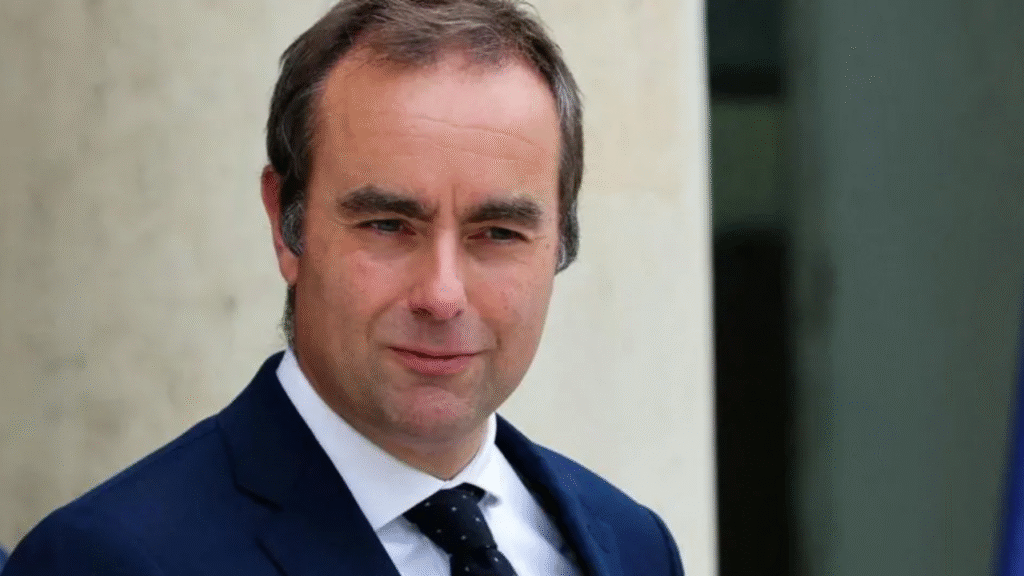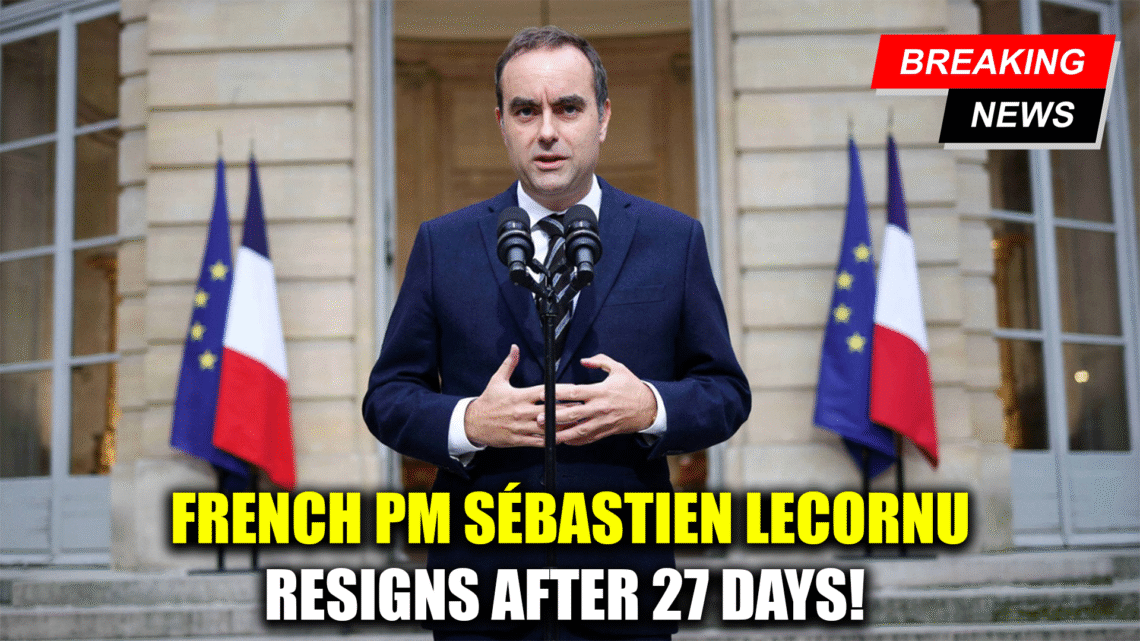In a shocking political twist, French Prime Minister Sébastien Lecornu’s resignation after less than a month has plunged France into fresh uncertainty. His abrupt departure, just 27 days after taking office, has stirred debates over leadership, governance, and the deepening cracks within President Emmanuel Macron’s administration. The phrase “French Prime Minister Sébastien Lecornu resigns after less than a month” has since dominated headlines, reflecting not just a political event, but a growing symbol of France’s institutional instability.

The Shortest Chapter in France’s Political History
Lecornu’s government now holds the record for one of the shortest-lived administrations in the Fifth Republic. His resignation, tendered amid internal rebellion and external pressure, has left the nation wondering how a leader once viewed as Macron’s trusted reformer could fall so quickly.
A Promising Start That Turned Sour
When Sébastien Lecornu assumed the premiership, he was seen as a pragmatic moderate — young, composed, and loyal to Macron. His mission was clear: rebuild parliamentary trust, unite a fragmented government, and restore France’s political balance. Yet, within days, disillusionment crept in. The public and opposition alike criticized his cabinet choices, calling them a “continuation of the past,” rather than the “fresh start” France had been promised.
The Weight of a Divided Parliament
France’s National Assembly remains fractured, with Macron’s Renaissance party holding no absolute majority. Lecornu faced immediate resistance from opposition blocs — both the left-wing alliance NUPES and Marine Le Pen’s far-right National Rally. Without stable parliamentary support, his government’s survival looked uncertain from the very beginning.
Why Sébastien Lecornu Resigned So Quickly
1. Backlash Over a Familiar Cabinet
Lecornu’s decision to retain many of Macron’s old ministers was seen as tone-deaf. After years of social unrest and political fatigue, citizens were expecting a bold reshuffle. Instead, they got continuity — and critics accused Lecornu of recycling the same political faces responsible for public discontent.
2. Mounting Pressure Over Policy Gridlock
Within weeks, Lecornu’s government faced multiple challenges: stalled economic reforms, public sector strikes, and a contentious budget debate. With the opposition readying a no-confidence motion, the new prime minister was cornered. Resigning seemed the only way to avoid a humiliating parliamentary defeat.
3. Macron’s Strained Influence
President Macron’s hands-on governing style has been both his strength and weakness. Many insiders claim Lecornu had little freedom to maneuver, effectively becoming a “caretaker” of Macron’s agenda. The constant presidential oversight eroded Lecornu’s credibility and authority, leaving him politically isolated.
4. Refusal to Invoke Article 49.3
In a symbolic stand for democratic integrity, Lecornu refused to use Article 49.3 — a constitutional clause allowing the government to bypass Parliament. While praised by some as principled, the move severely limited his ability to pass key legislation. Critics argue this decision sealed his fate.
Political Fallout: France’s Crisis Deepens
Macron’s Waning Grip
Lecornu’s resignation exposes a larger problem — Macron’s diminishing control over his own political machinery. The president has now cycled through multiple prime ministers, each facing the same structural deadlock: a fragmented legislature and a restless electorate.
Unrest in the Streets
In the days following Lecornu’s resignation, protests reignited in major French cities. Citizens expressed anger over what they see as a “government in chaos.” Economic anxiety, rising living costs, and distrust in political elites have fueled a wave of frustration reminiscent of the Yellow Vest movement.
A Leadership Vacuum
With Lecornu’s departure, France faces a leadership vacuum at a critical moment. The absence of stable governance jeopardizes urgent reforms in education, energy policy, and defense. The political impasse could further weaken France’s standing in the European Union, especially as key budget and migration decisions loom.
Lessons from Lecornu’s Fall
Understanding the Real Lesson Behind Lecornu’s Swift Exit
Lecornu’s resignation teaches that political legitimacy cannot be built on continuity alone. In a democracy facing social division and economic strain, symbolic leadership matters as much as policy. The public was not just waiting for new ministers — they were waiting for a new direction.
The Importance of Listening to Public Sentiment
Modern politics demands empathy and adaptability. Leaders must anticipate shifts in public mood rather than react to crises. Lecornu’s government misread the atmosphere — mistaking political loyalty for public approval.
Transparency and Reform as the Only Way Forward
If France’s leadership hopes to restore trust, it must embrace transparency and true reform. Structural issues like budget imbalance, pension tensions, and social inequality can’t be fixed by reshuffles. They require courage, dialogue, and accountability.
Real-Life Example: The Short Tenure of Édith Cresson
France has seen similar turmoil before. In 1991, Prime Minister Édith Cresson — the first woman to hold the office — lasted less than a year amid scandals and controversy. Like Lecornu, she suffered from poor public approval and a hostile parliament. Her fall signaled a crisis of confidence in leadership, echoing Lecornu’s predicament decades later.
This historical parallel highlights how fragile French political institutions can become when leaders lose touch with citizens’ expectations.
Strategies for Political Stability in a Divided Nation
1. Build Genuine Coalitions
Instead of transactional alliances, leaders must pursue genuine partnerships across ideological lines. Collaborative governance can reduce polarization and promote compromise.
2. Empower Local Governance
Decentralizing decision-making allows communities to feel represented. Regional leaders can address localized issues faster than centralized bureaucracies.
3. Prioritize Public Engagement
Regular dialogue with citizens, unions, and civic organizations can prevent alienation. Transparency fosters trust — a currency more valuable than power itself.
4. Adopt Policy Realism
Ambitious reforms often fail due to lack of consensus. Governments should set achievable, incremental goals to rebuild credibility and momentum.
The Road Ahead for Macron’s France
France now faces a pivotal question: who can govern effectively amid such division? Macron must appoint a successor capable of bridging ideological gaps while maintaining reform momentum. But finding that balance will be difficult in a nation tired of recycled promises.
Political analysts suggest that Macron’s next move will define not only his presidency but also the stability of the Fifth Republic. Any new appointee will have to manage both domestic unrest and France’s role within the EU — all while trying to repair a deeply fractured public trust.
Conclusion
The story of French Prime Minister Sébastien Lecornu’s resignation after less than a month is more than a headline — it’s a reflection of France’s political fragility. His 27 days in office symbolize the challenge of leadership in an era of division, where public trust is scarce and political patience is thin.
For Macron, Lecornu’s fall is a wake-up call: change cannot come from the top alone. To restore stability, France needs more than cabinet reshuffles — it needs renewed dialogue, inclusive governance, and leaders who listen. The episode serves as a reminder that, in politics, legitimacy is not inherited — it’s earned, every day.

FAQs
1. Why did French Prime Minister Sébastien Lecornu resign after less than a month?
He resigned due to political gridlock, lack of parliamentary support, and public backlash against his unchanged cabinet.
2. What was the main reason for Lecornu’s short tenure?
His refusal to use Article 49.3 limited his ability to pass laws, and without majority backing, his government became unsustainable.
3. How has Lecornu’s resignation affected Emmanuel Macron’s presidency?
It has weakened Macron’s credibility and highlighted the instability of his administration, deepening France’s political crisis.
4. What lessons can future French leaders learn from Lecornu’s experience?
Transparency, adaptability, and listening to citizens are crucial for political survival in modern democracies.
5. What happens next for France’s government?
Macron must appoint a new prime minister capable of uniting parliament and rebuilding public confidence.





